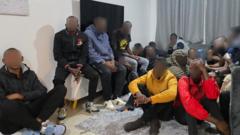How Did Police Disrupt a Trafficking Ring Sending Kenyans to Fight in Ukraine?

Published: 2025-09-27 11:30:27 | Category: world
Recent police operations in Kenya have uncovered a suspected human trafficking ring that reportedly deceived over 20 individuals with false job offers in Russia, only to intend sending them to fight in Ukraine. This alarming situation highlights the increasing exploitation of desperate job seekers in Kenya.
Last updated: 31 October 2023 (BST)
Key Takeaways
- Over 20 Kenyans rescued from human trafficking in Nairobi.
- Victims lured with job offers in Russia, intended for conflict in Ukraine.
- Arrest of a suspect coordinating the trafficking operations.
- Concerns grow over the rise in trafficking incidents linked to false employment promises.
- Victims reported paying significant sums for travel and logistics.
The Context of Human Trafficking in Kenya
Human trafficking remains a significant issue in Kenya, where vulnerable citizens are exploited by traffickers promising legitimate work opportunities abroad. In recent years, the number of Kenyans falling victim to such schemes has risen sharply, particularly those offering employment in foreign countries.
The latest incident, involving the rescue of 22 individuals from a residential apartment in Athi River, exposes the dangerous tactics employed by traffickers. According to reports, these individuals had been led to believe they would be working in Russia but were actually being recruited for military service in Ukraine.
The Raid and Rescue Operation
On 30 October 2023, a coordinated raid led by Kenyan police resulted in the rescue of more than 20 individuals. Officers seized various materials, including recruitment documents, travel papers, and job offer letters, indicating the operation was well-planned and targeted. This intelligence-led initiative underscores the Kenyan authorities' commitment to combating human trafficking.
One suspect has been detained, accused of facilitating the victims' illegal travel to Russia in recent months. The court has allowed him to remain in custody for 10 days while investigations continue. The police are working tirelessly to dismantle the trafficking network that has reportedly extorted significant amounts from hopeful job seekers.
How Trafficking Works: The Process
Traffickers often employ a systematic approach to lure victims:
- **Deceptive Recruitment**: Victims are attracted through enticing job offers and promises of a better life.
- **Contracts and Payments**: Many victims sign contracts with overseas employment agencies, agreeing to pay hefty fees—sometimes up to $18,000 (£13,000)—for services that include visas, travel, and accommodation.
- **Initial Payments**: Traffickers often require initial deposits; victims have reported paying around $1,500 (£1,200) upfront.
- **Transport to Destination**: Once the payments are made, victims are transported, often under false pretences, to their intended destination.
- **Exploitation**: Many victims find themselves in dire situations, such as being forced into military service or other forms of exploitation.
The Human Cost of Trafficking
The implications for the victims of this trafficking network are severe. Those who have returned often do so injured or psychologically scarred from their experiences. The case of a young Kenyan athlete, who found himself coerced into joining the Russian army, illustrates the personal tragedies intertwined with these events.
Reports indicate that two Kenyans have recently returned from Ukraine; one is currently hospitalised, highlighting the physical and emotional toll of such exploitation. The Kenyan government has expressed concern over its citizens being potentially held as prisoners of war in Ukraine.
International Responses and Ongoing Concerns
The international community has been alerted to the dangerous patterns of trafficking that affect not only Kenyans but also citizens from various African nations. According to Petro Yatsenko, spokesperson for Ukraine's treatment of prisoners of war, many African states show minimal interest in the plight of their nationals captured in conflict zones.
This lack of action raises critical questions regarding the responsibility of governments in protecting their citizens from trafficking and ensuring their safe return in times of conflict.
What Happens Next?
As investigations continue, the Kenyan authorities are likely to increase efforts to combat human trafficking. This may involve enhanced public awareness campaigns to educate potential job seekers on the dangers of falling victim to fraudulent job schemes.
Additionally, there may be international collaborations aimed at strengthening legal frameworks and resources to combat trafficking. The situation remains fluid as more reports of trafficking emerge, fuelling calls for urgent action to protect vulnerable populations.
Conclusion: A Call to Awareness
The recent events in Kenya serve as a stark reminder of the need for greater awareness and preventative measures against human trafficking. As desperate individuals continue to seek better opportunities abroad, it is crucial that they are informed of the potential dangers that come with such promises. How can governments, NGOs, and communities work together to protect vulnerable populations from these criminal networks?
#HumanTrafficking #Kenya #JobScams
FAQs
What is human trafficking?
Human trafficking involves the illegal trade of people for exploitation, often through deceit or coercion, including forced labour or sexual exploitation.
How does human trafficking happen?
Traffickers often lure victims with false job offers, requiring upfront payments for services such as visas, only to exploit them upon arrival in the destination country.
What should I do if I suspect someone is a victim of trafficking?
If you suspect someone is being trafficked, contact local authorities or organisations that specialise in human trafficking for support and guidance.
What are the signs of human trafficking?
Signs of human trafficking can include lack of control over personal documents, fear of authorities, and unexplained injuries or changes in behaviour.
How is the Kenyan government addressing human trafficking?
The Kenyan government is reportedly increasing efforts to combat human trafficking through coordinated raids, public awareness campaigns, and legal action against traffickers.



